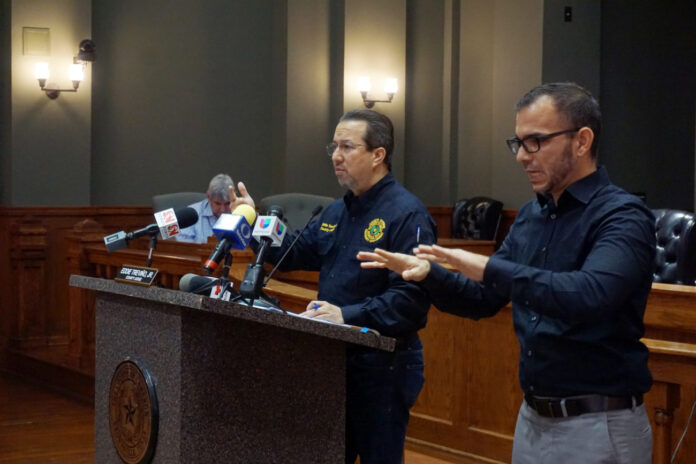As Cameron County residents began tuning into press conferences for updates on COVID-19, viewers began to recognize familiar faces interpreting the updates for deaf viewers.
One of those interpreters was Jovonne Delgado, the owner of South Texas Interpreters for the Deaf, a McAllen-area agency that provides an array of services including sign language interpreting for individuals in need.
The agency contracts with Cameron County. Delgado has over 22 years of experience in the field. She serves as Coordinator for the Sign Language Interpreter Training Program at South Texas College and is also an adjunct lecturer at the University of Texas Rio Grande Valley.
Delgado began interpreting by chance when a local school district contacted her looking for someone to interpret for a student. “My niece is deaf. I used to be a nurse; I had basic communication skill because I was able to communicate with her.”
“I told them I didn’t know if I could translate at an educational level. Long story short, they couldn’t find anybody else. I wasn’t meant to do it long-term. But, I ended up loving the child. I stayed with her for three years, improved in my skills and never went back to nursing again,” she said.
Sign language, explained Delgado, is extraordinarily versatile and exists in many forms. “People think ASL (American Sign Language) is a universal language – it is absolutely not. There’s every different kind of sign language you can think of. But, there are also different ways of interpreting,” she said.
“Deaf people will have a certain mode of communication depending on their upbringing and education levels. There’s what we call transliterating, which is more of an English format where you’re mouthing word per word. Then, we have interpreting, which is ASL.”
American Sign Language does not involve verbatim transliterating, but its mouth morphings, and syntax is different from English. “Texas actually tests you on transliterating, interpreting, and then sign-to-voice,” she said. “If you hold a PhD, the ways you express yourself and your voice for them better match that register. If somebody is expressing themselves in a way that is maybe at a lower register, you would have to express that.”
Delgado recommends that anyone interested in becoming a certified interpreter develops a healthy reading habit to expand vocabulary. “Read a lot. Become very familiar with what’s going on in the world. That makes an excellent interpreter,” she said.
“The district would send me to workshops and trainings. But, if you engage with the deaf community, they will take you under their wings. They will teach you and help you because they know the need for interpreters is tremendous.”
There are an estimated 10,000 deaf people in the Rio Grande Valley, a number Delgado cited based on data published seven years ago. She suspects the real number is higher and estimated the number of licensed interpreters in the RGV at 16.
Though the sign language program at STC is intensive, graduates seeking higher pay often leave the Valley for larger cities, where the base pay for an interpreter just entering the field doubles, to around $38,000 a year.
Interpreters are used for anything and everything that a deaf person might want to accomplish during an average day. Services from hospitals, to education, colleges, public school systems all need interpreters to accommodate deaf students under the Americans with Disabilities Act (ADA). Some tasks may be as simple as opening a bank account, buying a car, attending a meeting, visiting the doctor, or registering for classes.
Though the Valley lacks sign language interpreters, Delgado suspects this may be changing, as parents with deaf children often have to travel to McAllen or Brownsville, where there are established regional schools for the deaf. Parents are requesting ADA accommodation so they don’t have to travel to other districts.
“We need more interpreters. You’ve got to have a love for the deaf community. But, it’s important to remember that the power belongs to the deaf consumer. We are a lifeline of communication, however, deaf people are very independent people. If the deaf person chooses to communicate in their own method, that’s their right to do so.”




